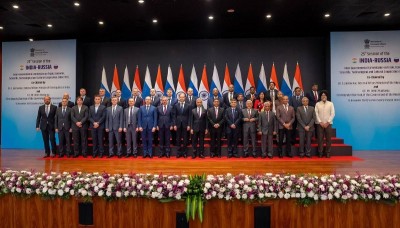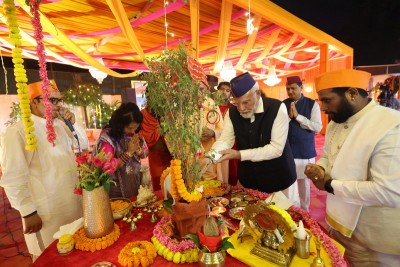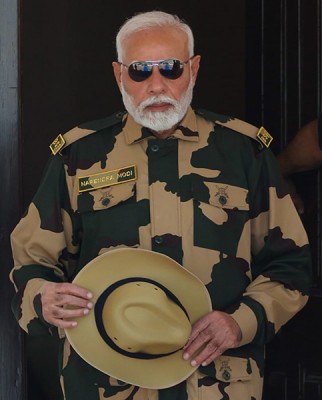
Desperate Measures
On February 23, 2015, four persons were killed in separate incidents of violence in Dhaka city during the same blockade programme.
According to partial data compiled by the South Asia Terrorism Portal (SATP), at least 90 people have been killed and more than 1,243 have sustained injuries in incidents of violence during the ongoing blockade, since January 5, 2015 (data till March 8, 2015). The largest number of killings were reported from the capital, Dhaka, where 27 persons have lost their lives; followed by 13 in Rangpur District; seven in Comilla District; six in Barisal District; five in Gaibandha District; four in Chittagong District; three each in Bogra, Chapainawabganj, Rajshahi and Noakhali Districts; two each in Natore, Chandpur, Jessore, Laxmipur and Sirajganj Districts; and one each in Feni, Gazipur, Magura, Pabna, Joypurhat and Sylhet Districts.
As in the past, the latest round of street violence has been orchestrated by the Opposition alliance. On December 31, 2014, the BNP led-alliance declared that it would observe January 5, 2015, as "Democracy Killing Day". Earlier, on December 12, 2014, the Awami League (AL) had declared that it would observe the date as the "Victory Day of Democracy". It was on January 5, 2014, that the General Elections were held in Bangladesh. The AL had won the elections boycotted by the Opposition alliance.
As tension rose, the Dhaka Metropolitan Police (DMP) banned all protests in the city and locked BNP Chairperson Begum Khaleda Zia in her office on January 3, 2015, to prevent her spearheading anti-Government protests as part of the Opposition efforts to topple Prime Minister Sheikh Hasina Wajed. Confined to her Gulshan office in Dhaka city, Khaleda Zia announced, on January 5, 2015, a countrywide indefinite blockade of roads, rail and waterways. Talking to reporters, she declared, "The Government has imposed the section 144 to foil our rally. You won't able to resist our programme by resorting to such a move. I want to say, a blockade programme will continue across the country until further announcement. I call upon people to continue it." Khaleda Zia continues to live in her office, though the virtual house arrest was lifted by authorities on January 19, 2015. In the meantime, pandemonium has spread across the country.
In addition to the loss of human lives, the countrywide blockade has led to economic catastrophe. Illustrating the grievous effect of blockades on the economy, Dhaka Chamber of Commerce and Industry (DCCI) President Hossain Khaled stated, at a Press Conference on January 22, 2015, that the preceding 16 days of political unrest had resulted in a loss of at least Bangladesh Taka (BDT) 364.45 billion. Thousands of business leaders protesting against the blockade in Dhaka city on February 8, 2015, claimed that the economy had suffered a BDT 750 billion loss in the 33 days since January 5, 2015. Prime Minister Sheikh Hasina, while replying to a question in the Parliament on February 25, 2015, disclosed that the 'subversive activities' by the BNP-Jamaat-e-Islami (JeI) alliance during the hartal (general strike) and blockade had caused a loss of over BDT 1.2 trillion to the country.
Meanwhile, calling the BNP-JeI alliance "murderers, terrorists and militants" on February 12, 2015, Prime Minister Sheikh Hasina rejected the possibility of holding any dialogue with them. Earlier, Finance Minister AMA Muhith at a meeting in Dhaka city on February 2, 2015, had said, "We now treat hartal and blockade as terrorist matters. The ongoing hartal and blockade should be stopped within short time." Giving a more stern warning, Shipping Minister Shajahan Khan while addressing a rally at Dhaka city's Phulbaria bus terminal on February 10, 2015, threatened, "Khaleda has confined herself by installing barbwire at her office. We, the workers of Bangladesh, will remove the barbwire and every brick the office has. We will launch such a movement that you will not able to maintain your existence and your politics will meet death."
Remarkably, United Nations (UN) Secretary General Ban Ki-moon sent letters to Prime Minister Sheikh Hasina and her rival BNP Chairperson Khaleda Zia on February 3, 2015, urging them to sit for talks to avoid political unrest. Similarly, deeply worried by political polarization in the country, 16 Ambassadors, High Commissioners and Charges d'Affaires of Australia, Canada, Denmark, European Union (EU), France, Germany, Japan, Netherlands, Norway, South Korea, Spain, Sweden, Switzerland, Turkey, United Kingdom (UK) and United States of America (USA), stationed in Dhaka city, wrote a joint letter to Prime Minister Hasina on February 24, 2015, and, in an effort to de-escalate political conflict, met BNP Chairperson Khaleda Zia at her political office in Dhaka city's Gulshan area on March 3, 2015.
Interestingly, Mohammad Mazhar Khan, attaché at the consular section of the Pakistan High Commission in Dhaka city, was withdrawn from Bangladesh on January 31, 2014, after intelligence dug out his involvement in terror financing and forged currency rackets. Bangladesh Foreign Ministry officials alleged that Mazhar was an agent of Pakistan's secret Inter-Services Intelligence (ISI). According to official sources, intelligence agencies learnt that earnings through the fake currency scam were given to militant and terrorist outfits such as the Hizb-ut-Tahrir (HuT), Ansarullah Bangla Team (ABT) and JeI-Islami Chhatra Shibir (ICS) axis, to carry out various acts of sabotage.
Meanwhile, the International Crimes Tribunal-2 (ICT-2), on December 23, 2014, awarded the death penalty to former State Minister of Agriculture during the Hussain Muhammad Ershad-led regime, Syed Mohammad Qaisar (74) of the Jatiya Party (JP), after finding him guilty on seven charges, including the killing of 108 civilians in 22 villages of Nasirnagar sub-District in Brahmanbaria District; involvement in rape of a woman at Jagadishpur village of Habiganj District; involvement in rape of a Santal(one of the oldest and largest indigenous communities in northwestern Bangladesh) woman at Chunarughat of Habiganj District; killing of two AL leaders in Habiganj District; killing of seven Government staffers of a food warehouse in Habiganj District; killing of four civilians of Madhabpur sub-District in Habiganj District; and the killing of Shah Firoz Ali and torture of Shah Hossain Ali at an Army camp in Shayestaganj sub-District of Habiganj District. Further, on February 18, 2015, ICT-2 sentenced JeINayeb Ameer (Deputy Chief) Abdus Subhan (77) to death on three charges: participation in the abduction and killing of three named and 17 unnamed people who had taken shelter at a mosque in Ishwardi; murder of six people including Rajab Ali Biswas and looting and torching of several houses in Sahapur village in Ishwardi; and killing of around 400 people in the Satbaria Union of Sujanagar.
Similarly, on December 30, 2014, ICT-1 awarded the death penalty to JeI Assistant Secretary General ATM Azharul Islam (61), after finding him guilty on three charges, including the Mokshedpur Dhap Para massacre on April 16, 1971; killing of around 1,400 unarmed civilians at Jharuarbeel in Rangpur District on April 17, 1971; and abduction and murder of four Hindu teachers of the Carmichael College and others on April 30, 1971. Further, ICT-1, which tried former JP Member of Parliament (MP) from Pirojpur District, Abdul Jabbar (82), in absentia, sentenced him to life imprisonmenton February 24, 2015, on four charges, including committing murders, plundering, arson and deportation from Fuljhuri, Kulupara and Nathpara in Mathbaria on May 16, 1971; for murders, plundering and arson at Fuljhuri on May 17, 1971; for genocide, murders and other inhumane acts at Naligram in Mathbaria on May 22, 1971; and for abducting 37 Hindus of Angulkata and Mothbaria and murdering 22 of them and plundering their houses, persecution and other inhumane acts committed from the evening of October 6, 1971 to the morning of October 7, 1971.
Thus far, the War Crimes (WC) Trials which began on March 25, 2010, have indicted 27 leaders, including 13 from JeI, six from Muslim League (ML), four from BNP, and two each from JP and Nizam-e-Islami. Verdicts against 18 of them have already been delivered - 15 were awarded the death penalty, while the remaining three received life sentences. One of the 15 who received the death sentence, JeI Assistant Secretary Abdul Quader Mollah (65), who earned the appellation Mirpurer Koshai (Butcher of Mirpur), has already been executed, while the remaining 14 death penalties are yet to be executed. Out of three persons who were awarded life sentences, two persons have already died serving their sentence: JeI Ameer (Chief) Ghulam Azam (91), who died on October 23, 2014; and former BNP minister Abdul Alim (83), who died on August 30, 2014.
Through 2014, the AL-led Government consolidated its secular commitments by minimizing the threat of Islamist extremists within the country and kept its promise to punish the perpetrators of the 1971 genocide by bringing the War Crimes' perpetrators to justice with visible gains. But, the nation is once again in the grip of violence, with no signs of the BNP-led alliance's softening its position. While addressing a crowded press conference at her Gulshan office on January 19, 2015, Khaleda Zia had declared that the ongoing countrywide blockade programme would continue indefinitely, till her next announcement. Meanwhile, BNP Joint Secretary-General Salahuddin Ahmed, in a statement on February 19, 2015, reiterated that the blockade will continue.
Sheikh Hasina has tackled the rising spectre of Islamist extremism and terrorism in Bangladesh with a high measure of success. She has been far less effective, however, in handling the fractious and polarized politics of the country, and the corrosive practice (one that her party also followed while in Opposition) of disruptive street violence and protracted blockades that have worked to the enormous detriment of the national interest. With the Opposition parties driven into a corner at present, excluded - by their own misjudgment of Hasina's intent and will, and their leaders falling one by one to the War Crimes Trials, a quality of desperation has entered into the current cycle of protests. Members of the BNP-led alliance now see their very survival under threat and are likely to escalate in a bid to force Hasina to dilute her current onslaught against them. Hasina, on the other hand, would put her own physical survival at risk by allowing any political space to the extremist formations that are part of the Opposition combine. Both sides have sufficient motive to push the situation to breaking point.
Support Our Journalism
We cannot do without you.. your contribution supports unbiased journalism
IBNS is not driven by any ism- not wokeism, not racism, not skewed secularism, not hyper right-wing or left liberal ideals, nor by any hardline religious beliefs or hyper nationalism. We want to serve you good old objective news, as they are. We do not judge or preach. We let people decide for themselves. We only try to present factual and well-sourced news.







